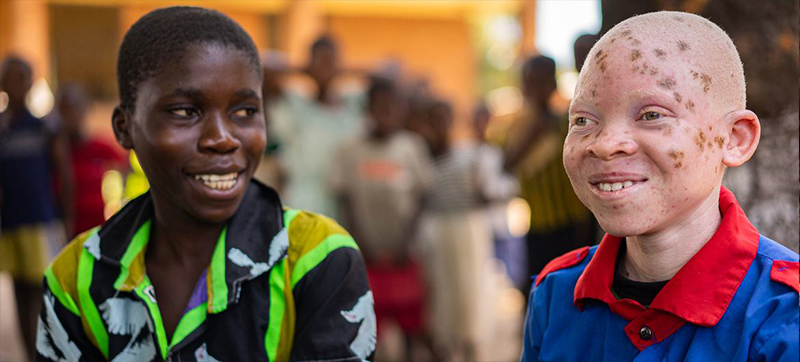 Albinism
Albinism
‘Inclusion is strength’ stresses UN, marking Albinism Awareness Day
Wider inclusion of persons with albinism can go a long way towards ensuring they live free from fear and discrimination, a UN human rights expert has said.
Persons with the condition – which is caused by a lack of melanin pigmentation, affecting skin, hair and eye colour - continue to face an uphill battle to attain a life with dignity and equality, said Muluka-Anne Miti-Drummond, the UN Independent Expert on albinism.
Tweet URL
“My clarion call today is for Governments, UN counterparts, civil society organisations, influencers, community members and all stakeholders to reach out to persons with albinism and ensure their voices are heard – to form new partnerships and strengthen existing ones,” she said in a message to mark International Albinism Awareness Day on Tuesday.
Worldwide representation
Albinism is a rare, non-contagious, genetically inherited condition that is present at birth. It is found in both sexes regardless of ethnicity and in all countries worldwide.
Albinism is much more prevalent in sub-Saharan Africa, with estimates of one in 1,400 people being affected in Tanzania, according to the UN.
Prevalence as high as one in 1,000 has been reported for select populations in Zimbabwe and for other specific ethnic groups in Southern Africa.
Cancer and other dangers
Almost all people with albinism are visually impaired and prone to developing skin cancer.
They also face discrimination due to their skin colour, meaning they are often subject to multiple and intersecting discrimination on the grounds of both disability and skin colour. In some cultures, they have been killed for their body parts.
Over the past decade, UN human rights entities have received reports of more than 600 attacks against children and adults with albinism. Witchcraft was identified as one of the root causes of these attacks, as some believe that the body parts of people with albinism can bestow good luck or wealth.
Diversity and collaboration
This year, the International Day is being celebrated around the theme of “Inclusion is Strength”, which upholds the importance of diversity - both within and outside the albinism community.
Specifically, it highlights the value and benefits of including a broad spectrum of persons with albinism in albinism-related discussions, such as young people, women, children, older persons and LGBTQ+ persons of all races and ethnic backgrounds.
It also calls for collaborating and embracing albinism within the disability movement, and in other sectors where decisions affect persons with the condition, as well as teaming up with other groups outside the albinism movement, such as those working to advance human rights.
Translate policies into action
“Today, we have the opportunity to pause, reflect and remember that not all persons are treated equal, and that many persons with albinism continue to suffer human rights abuses and violations, often invisibly and in silence,” Ms. Miti-Drummond said.
She was adamant that persons with albinism cannot be excluded or left behind when it comes to decisions affecting them, stressing that human rights laws, policies and dialogue, must include issues relating to albinism.
“More critically, these must translate to actions and tangible results,” she said.
“Such a journey for inclusion should not be difficult given the myriad of human rights commitments States and stakeholders have undertaken at the international, regional, and national fora,” she added.
“Human rights mainstreaming is a common mantra, and the challenges faced by persons with albinism can be eliminated through strengthened partnerships and collaboration.”
Support Our Journalism
We cannot do without you.. your contribution supports unbiased journalism
IBNS is not driven by any ism- not wokeism, not racism, not skewed secularism, not hyper right-wing or left liberal ideals, nor by any hardline religious beliefs or hyper nationalism. We want to serve you good old objective news, as they are. We do not judge or preach. We let people decide for themselves. We only try to present factual and well-sourced news.







